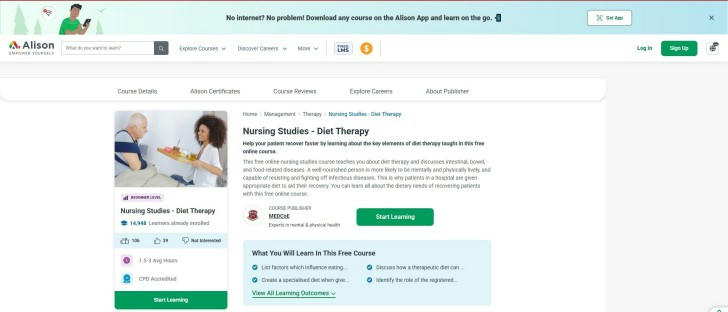Unlocking Better Patient Care: The Power of Diet Therapy in Nursing
"Nursing Research - Dietary Therapy" is an online course that focuses on the application of dietary therapy in nursing. It helps nurses and medical professionals understand how to support patient recovery through diet and is particularly suitable for beginners. The course lasts about 1.5 to 3 hours and is self-paced, suitable for busy professionals.
The Overlooked Role of Nutrition in Healthcare

Nutrition plays a crucial role in patient care, yet it is often overlooked in traditional nursing education. The food a patient eats can influence recovery speed, reduce complications, and even prevent hospital readmission.
Nurses are on the front lines of patient care, and their ability to manage and guide proper nutrition is essential. A well-planned diet can improve health outcomes for patients recovering from surgery, managing chronic conditions like diabetes, or dealing with malnutrition in long-term care settings.
The "Nursing Studies - Diet Therapy" course offers healthcare professionals a structured way to understand how diet impacts health. This online course teaches practical skills that nurses can apply immediately in their daily work. In just a few hours, learners will grasp essential concepts that can transform patient care.
Why Nutrition Knowledge Is Essential for Nurses

The connection between diet and health is undeniable. A patient’s ability to heal and regain strength depends on getting the right nutrients. Research supports this:
A study in the Journal of Clinical Nursing found that patients with personalized nutrition plans had hospital stays shortened by an average of 1.5 days (Journal of Clinical Nursing).
The American Nurses Association stresses that good nutrition is a key component of modern healthcare (ANA).
The World Health Organization (WHO) estimates that at least one-third of diseases worldwide are directly related to poor nutrition (WHO).
Despite this, many nurses receive minimal formal training in nutrition. This gap can lead to missed opportunities in patient care. When nurses understand how different diets impact conditions like heart disease, diabetes, and post-surgical recovery, they can make informed recommendations that improve patient outcomes.
What the Course Covers
The "Nursing Studies - Diet Therapy" course is structured into four key learning areas:
Dietary Influences – Explores how cultural, religious, and personal preferences shape eating habits.
Therapeutic Diets – Covers how specific diets manage medical conditions, such as low-sodium diets for heart disease or carbohydrate-controlled diets for diabetes.
Hospital Diet Plans – Teaches about different hospital meal options, from soft diets for post-surgery patients to clear liquid diets for digestive issues.
The Nurse’s Role – Shows how healthcare professionals can apply diet therapy principles in real-world settings.
Real-Life Patient Cases: The Impact of Nutrition
Understanding diet therapy isn’t just theoretical—it has a direct impact on patient recovery. Consider these cases:
Case 1: Jane, a 55-year-old woman with type 2 diabetes. Despite taking medication, her blood sugar remained high. A nurse trained in diet therapy identified the issue—Jane wasn’t balancing carbohydrates properly. The nurse explained portion control and the benefits of fiber-rich foods like oats and vegetables. Three weeks later, Jane’s blood sugar levels improved, and she had more energy.
Case 2: Tom, a 60-year-old recovering from surgery. He had no appetite, which slowed his healing. His nurse, using diet therapy knowledge, suggested frequent, small meals—like protein-rich yogurt and fruit smoothies. She also encouraged family involvement. Within days, Tom’s energy levels improved, and his recovery time was shorter than expected.
These cases show how even minor dietary adjustments can lead to significant improvements in patient health.
The Rising Demand for Nutrition Knowledge in Healthcare
The need for nurses with nutrition expertise is growing. The U.S. Bureau of Labor Statistics (BLS) projects a 6% job growth for registered nurses through 2031, partly due to the increasing focus on preventive care (BLS).
Malnutrition is a critical issue, especially among older adults. A 2018 study in the Journal of the American Medical Directors Association found that up to 85% of nursing home residents suffer from malnutrition (JAMDA). Nurses with diet therapy knowledge can help combat this issue by identifying at-risk patients and ensuring they receive proper nutrition.
Hospitals, long-term care facilities, and home healthcare agencies are looking for nurses who can integrate nutrition into patient care. Those with diet therapy training can contribute to better patient outcomes and lower healthcare costs.
How to Enroll in the Course

Joining the "Nursing Studies - Diet Therapy" course is simple:
Visit the Course Page – Go to Alison’s website and locate the "Nursing Studies - Diet Therapy" course (Course Link).
Create an Account – Sign up by entering an email and password.
Start Learning – Access the course materials at your own pace.
Complete the Course – Learn key diet therapy principles and pass the final assessment.
Earn a CPD Certificate – Upon successful completion, a Continuing Professional Development (CPD)-accredited certificate is available. Some fees may apply for certification.
Career Advantages of Diet Therapy Knowledge
Continuing education is essential for career advancement. The 2022 National Nursing Workforce Survey found that 47.2% of registered nurses hold a Bachelor of Science in Nursing (BSN) as their entry credential (Journal of Nursing Regulation).
A CPD-certified course like this one helps nurses stand out in a competitive job market. Hospitals and healthcare facilities value nurses who have specialized knowledge, and diet therapy is becoming an increasingly important skill.
Beyond traditional nursing roles, this knowledge can open doors to jobs in:
Nutrition-focused nursing positions in hospitals and clinics.
Long-term care facilities, where elderly nutrition is a major concern.
Home healthcare services, assisting patients with diet planning.
Public health programs, educating communities on proper nutrition.
Why This Course Stands Out
Unlike many nutrition courses that focus on general diet principles, this program is tailored specifically for healthcare professionals. It is designed to provide immediate, practical applications rather than just theoretical knowledge.
Another advantage is the course’s flexible, self-paced format, making it accessible for working nurses and students. Whether you're just starting in healthcare or looking to enhance your skills, this course provides valuable knowledge in a short timeframe.
Final Thoughts: Why Nurses Should Learn Diet Therapy
Proper nutrition is a powerful tool in healthcare. Whether it’s helping a post-surgical patient recover faster, managing chronic diseases like diabetes, or preventing malnutrition in elderly patients, diet therapy plays a crucial role.
The "Nursing Studies - Diet Therapy" course provides essential skills that every nurse can use. In just a few hours, learners gain knowledge that can improve patient outcomes, enhance career opportunities, and contribute to better healthcare overall.
To learn more and start today, visit Nursing Studies - Diet Therapy.
